The word app is short for application. It refers to software programs designed to perform specific functions.
In the past, the term “app” mostly referred to mobile applications, with the concept surging in popularity after the release of the Apple iPhone (2007) and its App Store (2008), which made downloading apps mainstream.
But nowadays, we use the term app to refer to software on almost any device, not just phones.
There are apps on smartphones, tablets, laptops, and even on web browsers and smart TVs. Over the years, the term has expanded to include programs running on all sorts of platforms. For example, Apple calls its Mac software “apps” and Microsoft does the same for Windows software.
There are web apps that run in your browser, mobile apps on phones, desktop apps on PCs, and even apps on smart devices like watches or home assistants.

An app typically has a specific use
The vast majority of apps that we download onto our phones have specific uses. For example, a shopping app is an application for purchasing things online, often from one website. However, this is not always the case. Some of them have broad uses, i.e., we use them for a variety of tasks. When developers decide to create an app they typically do it to address a need or gap in the market that hasn’t been addressed.
Origin of app meaning application
Apple popularized the term in 2008 when it created the App Store. Its first iPhone came out one year earlier.
As the App Store and iPhone became more widely known and popular, the company and Apple device users started using the term app when referring to an App Store application.
Although the first word in App Store comes from Apple, the term app when talking about software programs for mobile devices and computers is short for application.
Popularity of apps
Social media and communication apps alone connect billions of people. YouTube has around 3.9 billion monthly users – nearly half the world’s population – making it the largest social platform. Facebook isn’t far behind with over 2 billion users, while photo and video-sharing services like Instagram and TikTok boast massive global audiences as well.
When it comes to messaging apps, WhatsApp leads with more than 3 billion users worldwide.
We also rely on apps for entertainment. Netflix serves streaming video to around 280 million paying subscribers, while music apps like Spotify reach over 600 million users globally.
